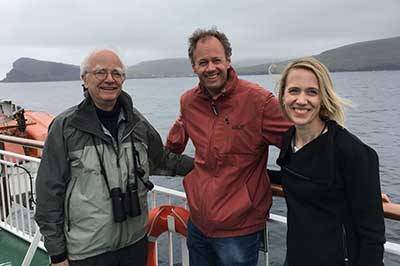The STEEP Superfund Program exists to assess public health risks from a group of chemicals developed to fight aeronautic fires, create nonstick pans, no-iron shirts, non-stain carpets and upholstery, water repellent hiking gear, and even keep a cheesy pizza from sticking to the delivery box. These compounds—classified as PFAS—have been around since the ’50s, but we now know they pack adverse health effects that outweigh the aspiration for widespread convenience. PFAS, or per- and polyfluoroalkyl substances, are widely recognized as toxins that contaminate both the built and natural environment. They are in our drinking water, become airborne, and eventually enter the foodweb.
Like many other communities around the world, the Faroese are exposed to PFAS through consumer products; however, some 50,000 residents of 18 islands have a secondary source of exposure through their traditional consumption of pilot whale meat and blubber. These lovers of dramatic fjords and multicolored cottages nestled among craggy mountains are exposed to industrial contaminants from faraway sources and at levels that in some cases greatly exceed those normally encountered elsewhere. Continued epidemiological research regarding the impact of PFAS on pre-natal and post-natal health of Faroese children enriches the STEEP team’s understanding of the adverse health impacts of PFAS as exposed populations mature.
In May 2018, the PPTOX Conference VI (Prenatal Programming & TOXicity) was held in the capital of the Faroe Islands with the goals of assessing past breakthroughs and highlighting new achievements on the effects of prenatal and early postnatal exposure to a range of toxicants of which PFAS were a major focus. Substantial evidence now suggests that the prenatal and early postnatal environment and timing of toxicant exposure are critical factors—among a variety of parameters—for gene expression, thereby affecting normal development and disease risks through adult life.
PPTOX was organized by STEEP Co-director Dr. Philippe Grandjean (HSPH), in collaboration with Dr. Pál Weihe, Chief Physician at the Department of Occupational and Public Health in the Faroese Hospital System. STEEP Director Dr. Rainer Lohmann (URI-GSO) and Project Lead Dr. Elsie Sunderland (HSPH) also attended the conference. STEEP scientists are international leaders in the field of emerging contaminants of which PFAS compounds are of particular concern due to their ubiquity and stability in the environment and humans.


